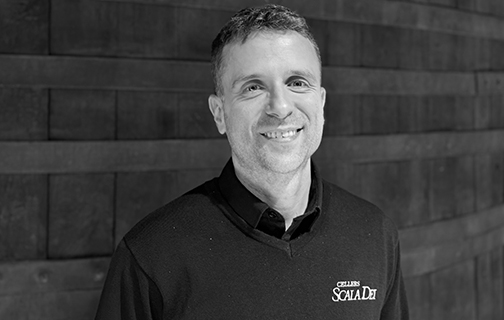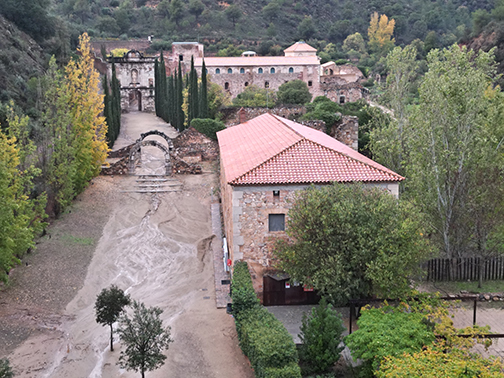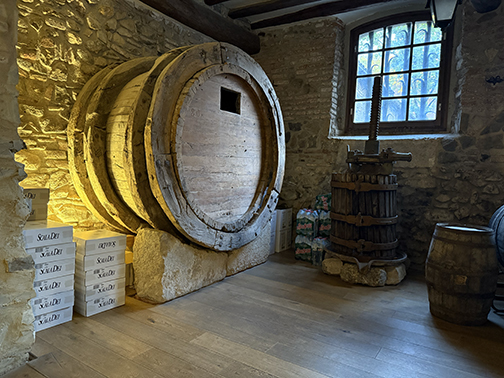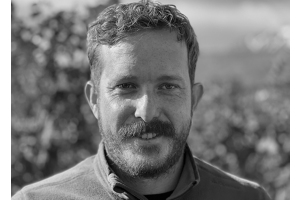In the slate covered hills of Catalonia's Priorat region, where ancient slate soils meet Mediterranean sunshine, stands Cellers de Scala Dei—a winery whose name translates poetically to "Stairway to God." Founded in 1163 by Carthusian monks who recognized the divine potential of this harsh terrain, Scala Dei holds the distinction of being the oldest winery in Priorat, establishing viticultural traditions that would eventually transform this once-remote corner of northeastern Spain into one of the world's most respected wine regions.
 The winery's storied past is inextricably linked to the magnificent monastery ruins that stand nearby, where monks once cultivated Garnacha and Cariñena vines on terraced hillsides. These spiritual beginnings have imbued Scala Dei with a sense of reverence that persists in their winemaking philosophy today—a commitment to minimal intervention that allows the distinctive mineral character of Priorat's llicorella soil to speak through each bottle. While modern techniques have been thoughtfully integrated, the essence of their approach remains firmly anchored in tradition.
The winery's storied past is inextricably linked to the magnificent monastery ruins that stand nearby, where monks once cultivated Garnacha and Cariñena vines on terraced hillsides. These spiritual beginnings have imbued Scala Dei with a sense of reverence that persists in their winemaking philosophy today—a commitment to minimal intervention that allows the distinctive mineral character of Priorat's llicorella soil to speak through each bottle. While modern techniques have been thoughtfully integrated, the essence of their approach remains firmly anchored in tradition.
Scala Dei's vineyards, some containing century-old vines that cling tenaciously to near-vertical slopes at elevations reaching 800 meters, represent viticulture at its most challenging and rewarding. The extreme conditions—intense summer heat tempered by cool mountain nights—create the perfect environment for producing wines of remarkable concentration and complexity.
Grape Collective talks to Diego Tamburini of Scala Dei about the unique history of the winery that is so intertwined with the development of Priorat.
Can you tell us about the history of Scala de Dei?
 Diego Tamburini: We are the oldest winery in the Priorat region. Our story begins with the Carthusian monastery, located 800 meters away. The monks who founded it came from Provence, France in the 12th century, invited by the Catholic king to re-Christianize the land after the Muslim period. They ruled as feudal lords until 1835.
Diego Tamburini: We are the oldest winery in the Priorat region. Our story begins with the Carthusian monastery, located 800 meters away. The monks who founded it came from Provence, France in the 12th century, invited by the Catholic king to re-Christianize the land after the Muslim period. They ruled as feudal lords until 1835.
This village, Calvary, was never actually a village but rather the commercial center of the monastery. When the monks left in 1835, five families bought their property. Four of those families still own the winery today. Initially, each family had their own winery in these three houses you see in the square. In 1973, they joined forces to create what is now Scala Dei.
We're considered an exception in Priorat because while over 90% of the region's soil is slate, our most historical vineyards are planted in clay soil, which runs from the monastery up to the mountain. This is the same reason the monks chose this location centuries ago - clay is more fertile and easier to work with. Today, this translates to wines that are fresher and smoother compared to classic Priorat wines from slate soils.
 Tell us about your grape varieties and winemaking.
Tell us about your grape varieties and winemaking.
The Carthusian monks brought Grenache with them from Provence, and it remains 80% of our production. From this village to the monastery, we only plant Grenache - no other varieties. We have 42 plots spread across 80 hectares, with altitudes ranging from 300 to 800 meters.
We essentially make two different styles of wine: those from the southern villages and those from the higher altitude clay soils near the mountain. Even though it's the same Grenache grape, they produce completely different wines due to the soil and altitude differences.
How has your winemaking evolved over time?
In the 1990s and early 2000s, like many Priorat producers, we made bigger, higher-alcohol wines with some international varieties like Cabernet Sauvignon. Since 2007, under new winemaking direction, we've returned to focusing on Grenache and our historical vineyards. Our wines today are actually more similar in concept to what we made in the 1970s.
For our single-vineyard wines, which represent about 10-15% of our production, we use concrete tanks for both fermentation and aging. We don't control temperature during fermentation, and we use whole-cluster fermentation because the stems ripen properly at higher altitudes. This gives structure to Grenache, which naturally lacks tannins.
What about your production and market presence?
We produce about 200,000 bottles annually, making us one of the larger producers in Priorat, where the average is 40-50,000 bottles. The entire Priorat region only produces 4 million bottles total. Our sales are split 50-50 between domestic and export markets, with main export markets being Switzerland, Germany, Netherlands, UK, and US.
The 2024 vintage was challenging - we lost about 40% of production due to drought conditions from the previous two years. However, recent rains have been good for the upcoming season.














